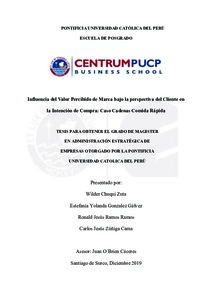| dc.contributor.advisor | O’Brien Cáceres, Juan | |
| dc.contributor.author | Chuqui Zuta, Wilder | |
| dc.contributor.author | Gonzalez Gálvez, Estefanía Yolanda | |
| dc.contributor.author | Ramos Ramos, Ronald Jesús | |
| dc.contributor.author | Zúñiga Cama, Carlos Jesús | |
| dc.date.accessioned | 2020-02-12T23:56:02Z | |
| dc.date.available | 2020-02-12T23:56:02Z | |
| dc.date.created | 2019-12 | |
| dc.date.issued | 2020-02-12 | |
| dc.identifier.uri | http://hdl.handle.net/20.500.12404/15902 | |
| dc.description.abstract | La presente investigación tiene como objetivo analizar el grado de influencia del valor percibido de marca desde la perspectiva del cliente en la intención de compra en las cadenas de comida rápida en Lima Metropolitana. Para ello, se realizó una revisión de literatura para encontrar un modelo adecuado que nos ayude a analizar el comportamiento del mercado peruano en cuanto a estas variables. El modelo elegido para nuestra investigación tiene como autores a Vazifehdust, Pakari y Ahmadvand quienes buscan medir el valor de marca sobre la base de cuatros constructos: la conciencia de marca, asociaciones de marca, calidad percibida y lealtad de marca, y finalmente su influencia en la Intención de compra; elegido principalmente debido a su simplicidad en cuanto a la aplicación de los constructos.
La investigación realizada se enfoca en cincos cadenas de comida rápida clasificadas por su alta participación en el mercado peruano. Para poder medir el modelo seleccionado, el estudio contiene un cuestionario de 22 preguntas que abarcan la medición de los constructos, traduciendo el entendimiento de las perspectivas de los clientes y la importancia del valor de marca en parámetros medibles. Para la determinación de la muestra se ha considerado un muestreo probabilístico donde se ha obtenido una participación aleatoria de 325 personas mayores a 18 años a través de una plataforma virtual.
Para el estudio de los resultados, se utilizó el análisis de correlación de Pearson y regresión lineal múltiple. Fruto del resultado se observa que existe una influencia positiva y significativa entre el valor de marca e intención de compra. En cuanto al análisis de los constructos, se obtiene que la asociación de marca, lealtad de marca y conciencia de marca explican el valor de marca, mientras que la calidad percibida no tiene significancia estadística en el modelo. Finalmente esta investigación ayuda a tener un panorama más amplio sobre el valor de marca en la intención de compra para posteriores tomas decisiones gerenciales. | es_ES |
| dc.description.abstract | The purpose of this research is to analyze the degree of influence of the perceived value of the brand from the perspective of the customer in the intention of buying in fast food chains in Metropolitan Lima. For this, a literature review was carried out to find a suitable model that helps us analyze the behavior of the Peruvian market in terms of these variables.
The model chosen for our research has as authors Vazifehdust, Pakari and Ahmadvand who seek to measure brand value based on four constructs: brand awareness, brand associations, perceived quality and brand loyalty, and finally their influence on the purchase intention; chosen mainly because of its simplicity in terms of the application of the constructs.
The research carried out focuses on five fast food chains classified by their high participation in the Peruvian market. To be able to measure the selected model, the study contains a questionnaire of 22 questions that cover the measurement of constructs, translating the understanding of customer perspectives and the importance of brand value into measurable parameters. For the determination of the sample, a probabilistic sampling has been considered where a random participation of 325 people over 18 years old through a virtual platform.
For the study of the results, Pearson's correlation analysis and multiple linear regression were used. Fruit of the result shows that there is a positive and significant influence between brand value and purchase intent. As for the analysis of the constructs, it is obtained that the brand association, brand loyalty and brand awareness explain the brand value, while the perceived quality has no statistical significance in the model. Finally, this research helps to have a broader picture of the brand value in the purchase intention for subsequent management decisions. | es_ES |
| dc.language.iso | spa | es_ES |
| dc.publisher | Pontificia Universidad Católica del Perú | es_ES |
| dc.rights | info:eu-repo/semantics/openAccess | es_ES |
| dc.rights.uri | http://creativecommons.org/licenses/by-nc-nd/2.5/pe/ | * |
| dc.subject | Restaurantes--Perú | es_ES |
| dc.subject | Investigación cuantitativa | es_ES |
| dc.title | Influencia del valor percibido de marca bajo la perspectiva del cliente en la intención de compra: caso cadenas comida rápida | es_ES |
| dc.type | info:eu-repo/semantics/masterThesis | es_ES |
| thesis.degree.name | Maestro en Administración Estratégica de Empresas | es_ES |
| thesis.degree.level | Maestría | es_ES |
| thesis.degree.grantor | Pontificia Universidad Católica del Perú. CENTRUM | es_ES |
| thesis.degree.discipline | Administración Estratégica de Empresas | es_ES |
| renati.advisor.dni | 07873020 | |
| renati.advisor.orcid | https://orcid.org/0000-0002-1019-2224 | es_ES |
| renati.author.dni | 10883074 | |
| renati.author.dni | 70077150 | |
| renati.author.dni | 46682179 | |
| renati.author.dni | 43530138 | |
| renati.discipline | 413307 | es_ES |
| renati.level | https://purl.org/pe-repo/renati/level#maestro | es_ES |
| renati.type | https://purl.org/pe-repo/renati/type#tesis | es_ES |
| dc.publisher.country | PE | es_ES |
| dc.subject.ocde | https://purl.org/pe-repo/ocde/ford#5.02.04 | es_ES |






